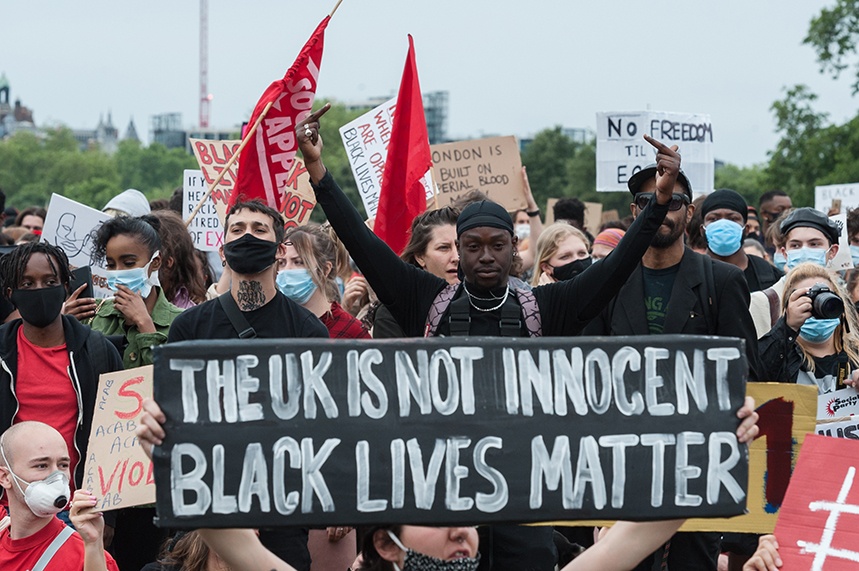There is a mistaken superiority in Britain on issues regarding race, one which compartmentalises racism to the US. There is a dangerous reluctance within the Government to admit the actualities of racism in the UK: a prerequisite to addressing racial injustice is accepting its existence. Claims that the UK is “not racist”, and that we’re “one of the most tolerant and open societies in the world”, both statements made by Boris Johnson and Matt Hancock, are myths which need refuting with fierce urgency.
The UK is not exempt from culpability: racism exists in this country and it is essential to stop denying it.
From unwarranted stop and searches to disproportionate imprisonment, racism is entrenched in the criminal justice system. In the UK, you’re nine times more likely to be stopped and searched by police and three times more likely to be arrested if you’re black. Despite only accounting for 3% of the general population, black people make up 12% of prisoners. Black people are more likely to have force used against them by police officers and die disproportionately in custody. This all happens in this country.
It’s problematic when these actualities of institutional racism in UK law enforcement aren’t enough to legitimise its existence for sceptics. However, there has been an abundance of indisputable footage surfacing which confirms racial profiling and undue brutality against black people by police. Last month, a black man was forcefully kneed in the head by Metropolitan police officers during a stop and search as he pleads “I didn’t do anything.” A black couple were stopped by police officers in their own driveway for “driving a motor vehicle on the road” because they “looked suspicious.” Another black individual was stopped by a policeman simply because, “no offence to you, you’re a black male.”
Racism is an inevitable systemic obstacle to everyday life; from wealth to housing, to unemployment. For every £1 a white family has in Britain, a black African household has approximately 10p. 68% of white British households are homeowners yet only 20% of black African households are. The unrelenting claws of systemic racism don’t even escape tarnishing the NHS, where for every £1 a black female doctor earns, a white male doctor earns £1.38, and where minority ethnic doctors are reported to the GMC at more than twice the rate as those white. From racist narratives in medical textbooks to maternal mortality and medication, racial health disparities are pervasive; the COVID-19 pandemic has accentuated this, with structural health and social inequalities contributing to black, Asian and minority ethnic individuals dying disproportionately.
The vulgar “white lives matter” banner which set sail over the Etihad Stadium in June and the aggressive Nazi salutes witnessed during the “anti-anti-racism” protests in London are both examples of how racism manifests as aggressive, hostile attitudes in a minority. However, more important than these examples of overt racial aggressions, are the ways in which racism manifests itself consistently as relentless passive microaggressions in the majority. Questions like “Where are you really from?”, statements like “you speak good English”, and Nick Ferrari’s comment to Afua Hirsch last week “if you don’t like it here, leave”: these everyday, often automatic, interactions which project the narrative that to be a person of colour must equate to being foreign, dangerous, or different, have racism inherent at their core.
Racism is the insidious dehumanisation of black individuals in the British media. Be it the comparison of Meghan Markle’s newborn baby to a chimpanzee, the account of her ‘exotic’ DNA, or the bizarre suggestion that her avocado consumption was fuelling mass murder: Meghan’s African heritage has submitted her to extensive criticism from the British media, something in stark contrast to the praise and admiration heralded to white royal princesses.
Dianne Abbott’s appearance on the mainstream political television programme BBC Question Time last year demonstrates how this mistreatment isn’t confined to the inflammatory rhetoric of British tabloids. The Labour Party had to demand an apology from the BBC over the hostile environment which saw Abbott be interrupted and mocked more than any other panel member, an incident simply pinnacle to how racism and misogyny have consistently fuelled targeted abuse towards Dianne throughout her political career.
What is imperative in discussions regarding race is to understand that racism extends beyond the undeserving, neck-crushing murder of a black individual in broad daylight. The murder of George Floyd took place on US turf, but this does not mean the UK is innocent. Racism is intrinsically tangled into our nation’s very social fabric: it wedges its unwanted presence into education, healthcare, culture, and everyday life.
The protests which have erupted across the UK in response to the murder of George Floyd have been not just about exhibiting solidarity with the US, but about confronting racial inequalities in this country. This is a monumental moment in history.
Racism is the wicked and hostile deportation of the Windrush generation. Racism is Grenfell. Racism is an ugly and unpalatable aspect of Britain’s past and present, and acknowledging it is imperative. No more claims from those in power that the UK is not racist please: combatting racial inequality begins with accepting it.
Tasha Ratti
Image: Getty.

